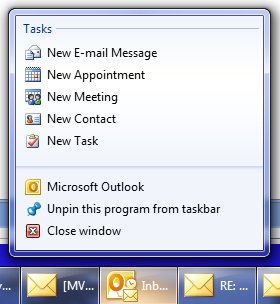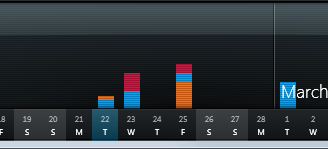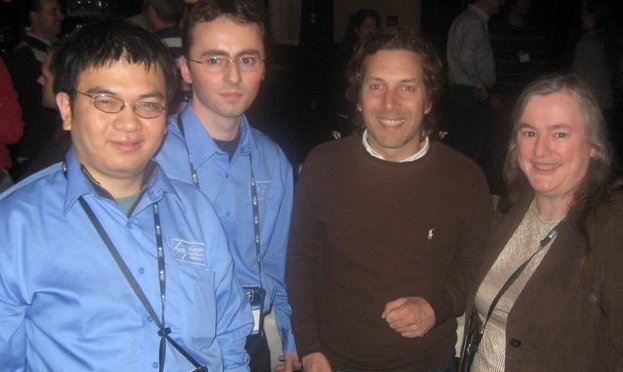 Monday, 21 March 2011
If you listen to .NET-related podcasts, you've probably come across the Pluralcast before. David Starr talks to a wide variety of people and the passion shows, along with the skills. Last year I appeared on the 'cast myself, talking about Visual Studio extensions. Now I'll be doing a small appearance regularly - still talking about Visual Studio and some helpful extensions or whatever else I want to share. There have been three of these so far: - #36 - main guest is Scott Allen
- #37 - main guest is Craig Shoemaker
- #38 - main guest is Liam McLennan
I hope you enjoy the whole episodes, and learn a little something from them. Kate
 Saturday, 19 March 2011
I'm on Channel 9 a lot right now - partly because some things are getting published that were done a long time ago, and partly because being on campus for the MVP Summit makes it convenient to be interviewed. I love talking to Charles because he really cares about the answers to the questions he asks. So we talked for half an hour about what it means to be an MVP, what C++ is useful for, what I like about C++0x, and that sort of thing. Since Charles started things off by mentioning previous conversations, let me toss in some links to those too - here's the Barcelona conversation (backstory here)and on the couch with the C++ guys (shorter backstory.) You can watch my hair change colour if you watch those oldest-to-newest. Diego was also nice enough to blog about this interview, too, as was John Bristowe of Microsoft Canada. Thanks for the chat, Charles! Kate
 Thursday, 17 March 2011
Here's another pair of screencasts to simplify your Windows 7 development. Both cover Restart and Recovery - one is for native developers and the other for managed. As the screencast intros say: Application
Recovery and Restart (ARR) technologies enable developers to customize an
application's behavior when Windows Error
Reporting(WER) terminates the application due to an unrecoverable error.
For example, it enables an application to perform data recovery and cleanup
operations such as capturing application state and releasing resources before
termination. It also allows developers to specify that WER should automatically
restart an application that it has terminated.
I hope they help you do the right thing when your application blows up or the machine reboots. Kate
 Tuesday, 15 March 2011
You know I blog here a lot about Windows 7 goodies including taskbar integration. One of the questions I get pretty often is how to use tasks to communicate with the running app, such as changing your status, sending a new email, that sort of thing. I mentioned in an aside on another post that this requires launching some other application that communicates with the first
instance. 
If you'd like to do that, it just got a little easier with the release of a "recipe" from Microsoft that packages up this concept and lets you use it with very little extra code. As it says on the Code Gallery page for the recipe: This Taskbar Single Instance Recipe allows developers to easily develop applications that use "Messenger Like" tasks that change the state of the currently running instance, allowing it to react to incoming state-change notifications and act accordingly.
This Recipe includes:
- Native (C++) and managed (.NET) Source code for the Single Instance library
- Well documented native (C++) and managed (.NET) samples
- Documentation
To compile and run the recipe and samples the following items are required:
- Microsoft Visual Studio 2010
- Windows 7 – Note that only the samples require Windows 7.
Yes, this recipe is actually two recipes - one native and one managed, and comes with whitepapers explaining how it's done. I mentioned this in my Tech Ed Europe talk on Advanced Windows 7 development and it's finally released for you to use! Enjoy! Kate
 Sunday, 13 March 2011
Whenever new stuff appears in the Microsoft universe, native C++ developers can get to it first. That's because they can easily call Windows APIs or COM interfaces or however it's implemented. Managed developers need to wait until the new stuff gets added to the .NET Framework or to a particular managed technology, like WPF. Take taskbar integration, for example: adding tasks and destinations, getting a progress bar or icon overlay on your taskbar icon, and so on. From the very beginning you could interact with the taskbar from native code by making Windows API calls. The Code Pack is a popular managed wrapper from Microsoft that enables those interactions from managed code such as Windows Forms applications. In the early days of Windows 7, WPF developers also used the Code Pack - but now those capabilities are in WPF itself. Does that mean that native developers get nothing new? On release day they gain the ability to call those APIs and that's that? Of course not. Native developers use frameworks and libraries to build their applications, and those frameworks and libraries in many cases are wrappers for Windows functionality. One of those is MFC and you should know that MFC has support for Windows 7 functionality. If that's news to you, then watch my screencast on Channel 9 in which I cover jumplists and overlays with lots of demos. It's just one or two lines of code for each of
these. Users expect their apps to behave like
this. MFC makes it simple.
Kate
 Friday, 11 March 2011
Writing samples and demos is tough. You want them to do more than say "Hello World" or draw a red square, but you want them to be simple enough that people can see the "new stuff" you're demoing (WPF, or Windows 7 taskbar integration) or multi-touch) in amongst the real business logic. It would be neat if they did something actually useful, because then you might keep it around on your machine and use it, but most things that are useful are too big to be demos. Well here's a sample that lands in the sweet spot: Tasks.Show. You put in your tasks, things from your ToDo list, along with time estimates, and it keeps track of them and shows them to you. I like this view: 
It uses touch to let you flick tasks into categories, and has taskbar integration to let you open a specific category, add a task, and so on. All the source code is available so you can see how it's done - it is a demo, after all. You can get more details and screen shots on the Windows Team Blog. Check it out! Kate
 Wednesday, 09 March 2011
I have two sessions in Atlanta:
DEV303 | Modern Native C++
Development for Maximum Productivity
Breakout Session |
300 - Advanced | Developer Tools, Languages & Frameworks C++0x, the next C++ standard, is almost upon us and it contains the most important updates to the language since the mid-90s. These new features bring more expressiveness and power to the native C++ developer. Microsoft Visual Studio 2010 has added support for some of these key features in order to enable these modern programming techniques. This session clarifies what features are in Microsoft Visual C++ 2010 and what is yet to come. It illustrates how new constructs such as lambda expressions enable better use of existing libraries and how your code can be simpler, safer and faster all at the same time. Also, see how simple it can be to implement concurrency in your application and how Visual C++ 2010 supports the difficult task of debugging parallelized code. If you are itching to show off how C++ is one of the coolest languages on the planet, this talk is for you!
DEV304 | Advanced Programming
Patterns for Windows 7
Breakout Session |
300 - Advanced | Developer Tools, Languages & Frameworks Windows 7 development in managed code can be very simple, especially for those using the Windows API Code Pack. But there's more! Your integration with Windows 7 doesn't have to be limited to simple interactions with the new API. This session goes beyond the simple and into aspects of Windows 7 development that have in the past been left for you to explore on your own. See how to create a jumplist with a task that delivers a command to your application, as Messenger and Outlook do. Explore a simple and powerful recipe for connecting to Restart and Recovery with minimal effort. Discover how Trigger Started Services can reduce your power footprint while giving your users better responsiveness. Explore all that libraries have to offer beyond "File Open" and why using a library is a better approach than having a user setting for "save directory." I'm looking forward to it. If you haven't registered yet, you should! Kate
 Monday, 07 March 2011
There are thousands of MVPs chosen by Microsoft for their contributions to technical communities. Eric Ligman says there are over 4,000 and I believe him. So of course nobody could choose a single "MVP of the year". There are several dozen this year, chosen from various technical areas and also for reasons that transcend a single technical area. I was delighted and honoured to be among them this year, and even more so to be joined by two of my fellow MVPs. To quote from an email telling us about it: ...the new 2010 C++ MVPs of the
Year are
- Kate Gregory,
for her very active role in promoting modern C++ application development, being
among top speakers in some prominent conferences. Kate was also selected by
peers (you guys) as C++ MVP of the Year.
- Marius Bancila – Ovidiu Cucu (shared), for the great job in CodExpert,
their C++ community site (in Romanian language).
- Sheng Jiang,
one of the top answerers in our MSDN Forums.
Is that amazing company or what? We were invited to dinner with a number of MS executives and the other MVPs of theyear during the MVP Summit. Here's a picture of us with Diego, the Visual C++ Community PM:  It was a great evening and it was nice to see C++ well represented. Kate
© Copyright 2026 Kate Gregory
Theme design by Bryan Bell
newtelligence dasBlog 2.3.9074.18820   | Page rendered at Tuesday, 10 February 2026 18:12:02 (Eastern Standard Time, UTC-05:00)
|
On this page....
Pluralsight Free Trial
Search
Navigation
Categories
Blogroll
Sign In
|